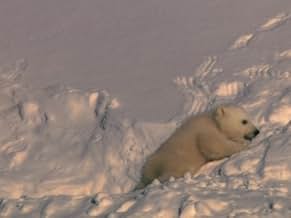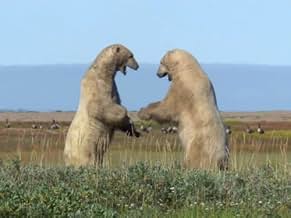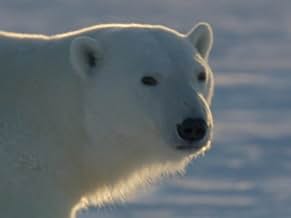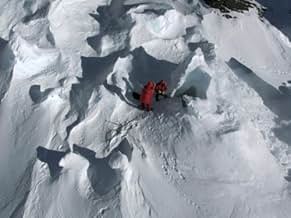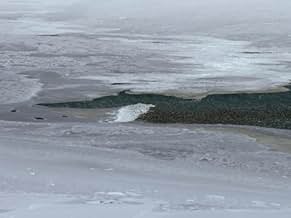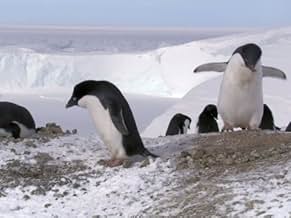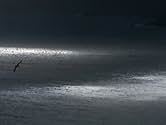Se centra en la vida y el medio ambiente tanto en el Ártico como en el Antártico.Se centra en la vida y el medio ambiente tanto en el Ártico como en el Antártico.Se centra en la vida y el medio ambiente tanto en el Ártico como en el Antártico.
- Ganó 4 premios Primetime Emmy
- 13 premios ganados y 9 nominaciones en total
Explorar episodios
Resumen
Reviewers say 'Frozen Planet' is acclaimed for its breathtaking cinematography and David Attenborough's engaging narration. The series excels in detailing animal behavior and adaptation, offering both educational and emotional value. Behind-the-scenes segments enhance appreciation for the production team's efforts in extreme environments. However, some note repetitive content and a slight focus on human impact, though these are minor compared to the series' overall quality.
Opiniones destacadas
Though I don't particularly enjoy animal documentaries, the second run of the BBC's "Frozen Planet" was on the Guardians list of top TV of last year, so I needed to give it a try. Despite the fact it's not a narrative-based show I still decided to watch the initial run from 2011 first. The effort involved is admirable, but as a documentary I found it to be a little repetitive.
The poles at either side of our planet are among the most inhospitable areas to exist. There are, however, various ecosystems that do survive there, with the changing seasons providing them with enough respite to either feed, breed or migrate as required. Polar Bears, Seals, Penguins and Orcas are amongst those species' films by the documentary, that uses underwater filming and time lapse photography to get unbelievably close to the animals.
This is probably the BBC at it's finest. An altruistic environmental documentary, beautifully shot in high definition and with a David Attenborough voiceover that can only be described as Iconic. The amount of personal sacrifice that goes into making a series like this is truly inspiring, with the "Freeze Frame" sections at the end of each episode giving us an insight into the conditions endured, and perils risked in order to get the footage. The footage is worth it though and even without the educational aspect just looking at what they captured would be enough. The final episode of the series is a change of pace, and focuses on human interaction in the polar regions, with both native people who live and hunt there, exploration bases and mining operations.
This might be a drawback caused by watching all the episodes in just a few days, rather than spacing them out one a week, as it would have originally been released, but there is quite a bit of repetition in the series. Some of this is endemic, Animals essentially eat, procreate, and die so if it's not doing one of these things, it's doing the other. More than that though, some specific bits of the series, I'm thinking specifically of the Orca's iceberg destruction technique and various bits of the penguin walks are shown more than once.
It doesn't derail the series which, like all of them, is a unique and fascinating insight into these ecosystems.
The poles at either side of our planet are among the most inhospitable areas to exist. There are, however, various ecosystems that do survive there, with the changing seasons providing them with enough respite to either feed, breed or migrate as required. Polar Bears, Seals, Penguins and Orcas are amongst those species' films by the documentary, that uses underwater filming and time lapse photography to get unbelievably close to the animals.
This is probably the BBC at it's finest. An altruistic environmental documentary, beautifully shot in high definition and with a David Attenborough voiceover that can only be described as Iconic. The amount of personal sacrifice that goes into making a series like this is truly inspiring, with the "Freeze Frame" sections at the end of each episode giving us an insight into the conditions endured, and perils risked in order to get the footage. The footage is worth it though and even without the educational aspect just looking at what they captured would be enough. The final episode of the series is a change of pace, and focuses on human interaction in the polar regions, with both native people who live and hunt there, exploration bases and mining operations.
This might be a drawback caused by watching all the episodes in just a few days, rather than spacing them out one a week, as it would have originally been released, but there is quite a bit of repetition in the series. Some of this is endemic, Animals essentially eat, procreate, and die so if it's not doing one of these things, it's doing the other. More than that though, some specific bits of the series, I'm thinking specifically of the Orca's iceberg destruction technique and various bits of the penguin walks are shown more than once.
It doesn't derail the series which, like all of them, is a unique and fascinating insight into these ecosystems.
True genius. It makes standing in the poles, what' really seems like an exhilarating experience feel it's being done by yourself. With polar bears and penguins in the joy of spring, the summertime with less blues, autumn filled with the excitement of the mating season, the hard land that is winter, and then in the conclusion, you have people living there and you can see them. This is a classic series with brilliant moments all through it. It won 4 Emmys because it deserved them more than anything else in 2009. Madagascar- one of Attenborough's best works, the amazing documentary Ocean Giants and the classic Human Planet. Frozen Planet beat all them because some of the amazing stuff, as well as educational (not something I look for in Docos) and exciting (this one is exciting, animal-action-packed series) but also never filmed before. Nobody had filmed at Antarctic volcanoes or the Russian arctic before. Migrating eider ducks was new and never done before. That is the magic behind a classic series. Do yourself a favour if you haven't already. Watch all 7 parts. Won't waste your time. You could do an episode a day and be finished with it in a week. Come on. It won't wreck your life or anything. C'mon.
Despite how much he apparently dislikes the term "national treasure", that term really does sum up David Attenborough to a tee. He is such a great presenter (in his 90s and still sounds, and looks on a side note, great) and whenever a new series of his is aired they are often among the best the BBC has done in years.
Am a great fan of both 'Planet Earth' series and 'The Blue Planet' in particular of Attenborough's work. 'Frozen Planet' is another masterpiece and is on the same level as them. Expectations were high, expectations were met and went beyond that, 'Frozen Planet', along with 'Planet Earth II' transfixed, fascinated, moved and educated me more than any other documentary seen in a long time and is an example of how documentaries should be done. Like what was said for 'Planet Earth II', and how is felt about 'Planet Earth' and 'The Blue Planet', one forgets they're watching a documentary and instead feeling like they're watching art. As hyperbolic as this all sounds, to me and many others the acclaim is more than deserved and even with many fans and a high rating here 'Frozen Planet' is perhaps not praised enough.
'Frozen Planet', as to be expected, looks utterly amazing. It is gorgeously filmed, done in a completely fluid and natural, sometimes intimate (a great way of connecting even more with the animals), way and never looking static. In fact much of it is remarkably cinematic. The scenery and habitats are some of the most breath-taking personally seen anywhere, whether in visual media and real life, wildlife, underwater, cave and volcano landscapes are done in a way that will leave even not-so-devoted nature documentary viewers on a whole new level of speechless. How the Arctic and Atlantic surroundings and how they're populated look during each season also fascinates and illuminates, even the controversial climate change episode, and the behind the scenes stuff adds a touch of honesty and humanity, such as the getting trapped in the wind and filming the orcas (killer whales).
George Fenton's music score soars majestically, rousing the spirits while touching the soul. It not only complements the visuals but enhances them to a greater level. Some of my favourite work from him in fact, coming from someone who's liked a lot of what he's done.
Can't fault the narrative aspects in 'Frozen Planet' either. There are things already known to me, still delivered with a lot of freshness, but there was a lot that was quite an education and after watching the full series it honestly felt like the series taught me a lot (and no it's not just the Latin names for the animals), much more so than anything in my secondary school Geography class. "To the Ends of the Earth", "Spring" and "Winter" were especially good. Attenborough's narration helps quite significantly too, he clearly knows his stuff and knows what to say and how to say it. He delivers it with his usual richness, soft-spoken enthusiasm and sincerity, never talking down to the viewer and keeping them riveted and wanting to know more.
The animals themselves are a wonderful mix of the adorable (the penguins, have somewhat of a bias due to loving penguins to bits) and the dangerous (the wolf). There were some truly powerful moments, including the wolf and bison attack, that was unlike any other nature documentary captured attack there's ever been. Powerful in ways that are heart-wrenching and harrowing, lots of suspense and pathos in 'Frozen Planet'.
None of the episodes feel episodic or repetitive, or even feel like episodes. 'Frozen Planet' instead feels like a collection of six individual stories with real, complex emotions and conflicts and animal characters developed in a way a human character would in a film but does it better than several.
Overall, utterly mesmerising and will unfreeze the iciest of hearts. 10/10 Bethany Cox
Am a great fan of both 'Planet Earth' series and 'The Blue Planet' in particular of Attenborough's work. 'Frozen Planet' is another masterpiece and is on the same level as them. Expectations were high, expectations were met and went beyond that, 'Frozen Planet', along with 'Planet Earth II' transfixed, fascinated, moved and educated me more than any other documentary seen in a long time and is an example of how documentaries should be done. Like what was said for 'Planet Earth II', and how is felt about 'Planet Earth' and 'The Blue Planet', one forgets they're watching a documentary and instead feeling like they're watching art. As hyperbolic as this all sounds, to me and many others the acclaim is more than deserved and even with many fans and a high rating here 'Frozen Planet' is perhaps not praised enough.
'Frozen Planet', as to be expected, looks utterly amazing. It is gorgeously filmed, done in a completely fluid and natural, sometimes intimate (a great way of connecting even more with the animals), way and never looking static. In fact much of it is remarkably cinematic. The scenery and habitats are some of the most breath-taking personally seen anywhere, whether in visual media and real life, wildlife, underwater, cave and volcano landscapes are done in a way that will leave even not-so-devoted nature documentary viewers on a whole new level of speechless. How the Arctic and Atlantic surroundings and how they're populated look during each season also fascinates and illuminates, even the controversial climate change episode, and the behind the scenes stuff adds a touch of honesty and humanity, such as the getting trapped in the wind and filming the orcas (killer whales).
George Fenton's music score soars majestically, rousing the spirits while touching the soul. It not only complements the visuals but enhances them to a greater level. Some of my favourite work from him in fact, coming from someone who's liked a lot of what he's done.
Can't fault the narrative aspects in 'Frozen Planet' either. There are things already known to me, still delivered with a lot of freshness, but there was a lot that was quite an education and after watching the full series it honestly felt like the series taught me a lot (and no it's not just the Latin names for the animals), much more so than anything in my secondary school Geography class. "To the Ends of the Earth", "Spring" and "Winter" were especially good. Attenborough's narration helps quite significantly too, he clearly knows his stuff and knows what to say and how to say it. He delivers it with his usual richness, soft-spoken enthusiasm and sincerity, never talking down to the viewer and keeping them riveted and wanting to know more.
The animals themselves are a wonderful mix of the adorable (the penguins, have somewhat of a bias due to loving penguins to bits) and the dangerous (the wolf). There were some truly powerful moments, including the wolf and bison attack, that was unlike any other nature documentary captured attack there's ever been. Powerful in ways that are heart-wrenching and harrowing, lots of suspense and pathos in 'Frozen Planet'.
None of the episodes feel episodic or repetitive, or even feel like episodes. 'Frozen Planet' instead feels like a collection of six individual stories with real, complex emotions and conflicts and animal characters developed in a way a human character would in a film but does it better than several.
Overall, utterly mesmerising and will unfreeze the iciest of hearts. 10/10 Bethany Cox
10Bert45
I was looking forward to this BBC series and I was not in any way disappointed. The work that went in to bringing us these wonderful visions of the polar regions is amazing. Thankfully, in New Zealand, we saw the David Attenborough-narrated version as it was meant to be. No disrespect to Alec Baldwin, who narrated the US version, but Sir David has been there and done that in wildlife film-making for the best part of 60 years. He KNOWS what he's talking about. I'm very aware of the "controversy" that surrounds the seventh episode titled On Thin Ice, and the apparent reluctance of US TV to show it because it deals with climate change. My advice is: don't let anyone tell you that this is a piece of climate change propaganda. It's not. It simply lays out the facts in a non-judgmental way and backs them up with historical photography and clear satellite imagery. Watch it and make up your own mind.
10fikamugg
To describe all the beautiful footage in this documentary is simply not possible. It's easily the best i have ever seen, even better than BBCs "planet earth" which was unique because of its big budget and extended production time (16M £, 5years). It's probable that production paid off in terms of skill and it certainly comes to show here in BBCs next effort when the mysteries and beauty of our planets frozen worlds is on the agenda.
More than anything else this production is a profound statement on how precious and unique our planet is and how immensely important it is that human impact on fragile ecosystems is kept to a minimum.
Richard Attenbourough is, as we all know by now, the perfect narrator. His deep interest and knowledge in natural history is apparent, adding a pleasant edge to this marvelous achievement.
More than anything else this production is a profound statement on how precious and unique our planet is and how immensely important it is that human impact on fragile ecosystems is kept to a minimum.
Richard Attenbourough is, as we all know by now, the perfect narrator. His deep interest and knowledge in natural history is apparent, adding a pleasant edge to this marvelous achievement.
¿Sabías que…?
- Trivia44 cinematographers to shoot the whole documentary.
- ConexionesEdited into Universum: Eisige Welten - Das Reich der Kälte im Bann des Klimas (2017)
Selecciones populares
Inicia sesión para calificar y agrega a la lista de videos para obtener recomendaciones personalizadas
- How many seasons does Frozen Planet have?Con tecnología de Alexa
Detalles
- Fecha de lanzamiento
- Países de origen
- Sitio oficial
- Idiomas
- También se conoce como
- Frozen Planet
- Locaciones de filmación
- Productoras
- Ver más créditos de la compañía en IMDbPro
- Tiempo de ejecución
- 1h(60 min)
- Color
- Mezcla de sonido
- Relación de aspecto
- 16:9 HD
Contribuir a esta página
Sugiere una edición o agrega el contenido que falta






